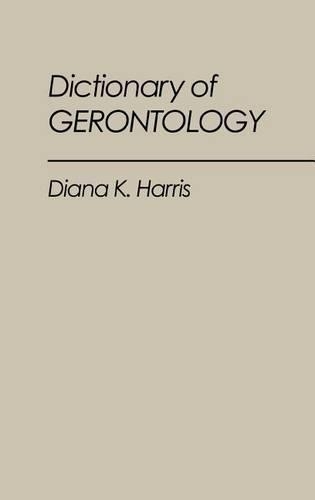
Dictionary of Gerontology
(Hardback)
Publishing Details
Dictionary of Gerontology
By (Author) Diana K. Harris
Bloomsbury Publishing PLC
Greenwood Press
27th July 1988
United States
Classifications
Tertiary Education
Non Fiction
612.67
Physical Properties
Hardback
216
Description
As the preface indicates, this sorely needed tool is more than a dictionary. In addition to defining terms specific to gerontology (`circuit breakers,' `Detroit syndrome') and multidisciplinary terms (`suicide,' `cholesterol') pertinent to gerontology, in alphabetic order, it provides one to four references for each term. . . . . Highly recommended for upper-division and graduate collections. Choice Because of the different disciplines that gerontology encompasses, the definition it uses can prove bewildering to students, scholars, and practitioners. Diana Harris is the first scholar to deal with this terminology in a comprehensive manner. Reflecting multidisciplinary perspectives and introducing standardization, her dictionary offers hundreds of precisely defined terms and concepts, as well as detailed, up-to-date bibliographic information. Because of the different disciplines that gerontology encompasses, the definitions it uses can prove bewildering to students, scholars, and practitioners. Diana Harris is the first scholar to deal with this terminology in a comprehensive manner. Reflecting multidisciplinary perspectives and introducing standardization, her dictionary offers hundreds of precisely defined terms and concepts, as well as detailed, up-to-date bibliographic information.
Reviews
A useful introductory reference that will undoubtedly be consulted on a regular basis by newcomers to the field of gerontology." Robert N. Butler, M.D. Brookdale Professor of Geriatrics and Adult Development The Mount Sinai Medical Center "Diana Harris Dictionary of Gerontology will prove to be a most useful reference for students, instructors and practitioners alike. It contains clear and concise definitions of hundreds of important gerontological concepts and terms. Particularly valuable are the bibliographic citations accompanying each entry where the original source, extended discussions, and research applications can be found. Harris is to be commended for providing us with this handy and excellent guide to the language of gerontology.---Stephen J. Cutler, Bishop Robert F. Joyce Distinguished University Professor of Gerontology
This dictionary in the new and growing field of gerontology serves a twofold purpose: to further the development of a specialized gerontological terminology; and because of the multidisciplinary nature of gerontology, to assist students, scholars, researchers, and practitioners in the field in understanding the terminology that is used in the various disciplines that gerontology encompasses.' Entries are in alphabetical order. The definitions range from one to five sentences and are clear, concise, and as jargon-free as possible. As in other Greenwood publications, internal cross-references are noted by asterisks, and see also references are given for related terms. The cross-references are well done. The Dictionary includes well-known terms; common terms applied to the field of aging; vocabulary related to medicine and research methods; and specialized theories, studies, terms, and organizations in the field. Several diagrams and graphs give additional information, and the book concludes with an index to personal names. The Dictionary of Gerontology is a good and useful effort that will be helpful in academic and public libraries.-Reference Books Bulletin
"A useful introductory reference that will undoubtedly be consulted on a regular basis by newcomers to the field of gerontology." Robert N. Butler, M.D. Brookdale Professor of Geriatrics and Adult Development The Mount Sinai Medical Center "Diana Harris Dictionary of Gerontology will prove to be a most useful reference for students, instructors and practitioners alike. It contains clear and concise definitions of hundreds of important gerontological concepts and terms. Particularly valuable are the bibliographic citations accompanying each entry where the original source, extended discussions, and research applications can be found. Harris is to be commended for providing us with this handy and excellent guide to the language of gerontology."---Stephen J. Cutler, Bishop Robert F. Joyce Distinguished University Professor of Gerontology
"This dictionary in the new and growing field of gerontology serves a twofold purpose: to further the development of a specialized gerontological terminology; and because of the multidisciplinary nature of gerontology, to assist students, scholars, researchers, and practitioners in the field in understanding the terminology that is used in the various disciplines that gerontology encompasses.' Entries are in alphabetical order. The definitions range from one to five sentences and are clear, concise, and as jargon-free as possible. As in other Greenwood publications, internal cross-references are noted by asterisks, and see also references are given for related terms. The cross-references are well done. The Dictionary includes well-known terms; common terms applied to the field of aging; vocabulary related to medicine and research methods; and specialized theories, studies, terms, and organizations in the field. Several diagrams and graphs give additional information, and the book concludes with an index to personal names. The Dictionary of Gerontology is a good and useful effort that will be helpful in academic and public libraries."-Reference Books Bulletin
Author Bio
DIANA K. HARRIS teaches in the Department of Sociology at the University of Tennessee at Knoxville.
